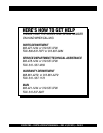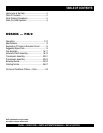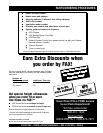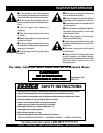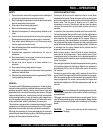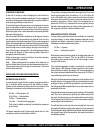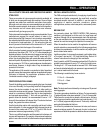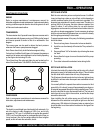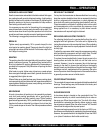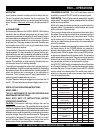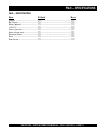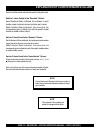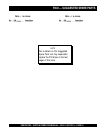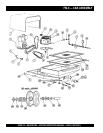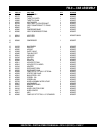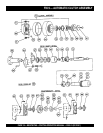
ESSICK FM9 — PARTS & OPERATION MANUAL — REV. #1 (03/12/01) — PAGE 11
PACKING GLAND ADJUSTMENT
Near the transmission and welded to the bottom side of the hopper
is a packing box with special rubberized packing. A split packing
gland is located on the outside of the hopper. By tightening this
gland the packing in the box is compressed to keep moisture
from leaking out around the shaft.
It is necessary on new units for the packing to be compressed
several times before it sets properly around the drive shaft. This
must be done when the unit is put into operation for the first time
as well as each time a complete new set of packings are installed.
The following is a suggested procedure of maintenance:
BREAK-IN
Tighten evenly approximately 100 in. pounds torque) the two
nuts located on packing gland. These nuts should be tight but
not so tight as to seize or bind the shaft. Do this twice a day for the
first 5 days of running time.
MAINTAIN
The packing should be lubricated daily with two shots of a good
grade of waterproof grease. The grease fitting located on the
drive line between the packing gland and the transmission is
provided for this purpose. Daily lubrication will prolong the life of
the packing.
After break-in period, tighten nuts at least once a week unless
there are signs of leakage around shaft, (periodic checks for this
is suggested) then tighten at once.
When all take-up on gland has been used, loosen packing gland,
coat new packing ring and drive shaft with a generous amount of
a good grade of waterproof grease, insert packing, and continue
to maintain as noted above.
NEW PACKING
At such a time when old packing is to be completely replaced,
coat shaft and packing generously with a good grade of
waterproof grease and insert packing rings. Tighten packing
gland nuts to approximately 150 in. pounds torque to seat packing,
then back off nuts so drive shaft is not bound, but not less than
100 in. pounds torque on the nuts. Then follow procedure outlined
above.
DRIVE SHAFT ALIGNMENT
If at any time the transmission is disassembled from its mounting
base then caution should be taken that on reassembly the drive
shaft is in alignment with transmission. to check alignment let
drive shaft with packing and packing gland installed, rest free.
Place transmission onto base.If mounting holes in drive shaft
and transmission do not line up without any pressure or force
being applied then it is necessary to place shims beneath
transmission until required height is obtained.
REPLACING AND ADJUSTING THE BELTS
For adjusting the belts on the countershaft pulleys the unit is
equipped with belt tighteners. The belts can be tightened by
turning the set screws on the counter shaft risers. When adjusting
the belts, both sides must be equally adjusted. the belts should
be fairly tight.
To adjust the compressor belts, loosen the compressor mounting
bolts and slide the compressor until belt is tight. Note: This belt
should not be as tight as the ones on the countershaft.
To replace the countershaft belts, loosen the set screws in the
bearing collars and slide the shaft out until the belts can be
removed. However, it may be necessary (due to the bearings
freezing to the shaft) to remove the two bolts on the bearing
bracket at each end and slide out the shaft and bearings. When
installing a new belt, readjustment will be necessary. After a few
hours of operation check the adjustment of the new belt as there
is generally a certain amount of initial stretch.
COUNTERSHAFT BEARINGS
The countershaft supports are equipped with double-sealed ball
bearings. These bearings are pre-lubricated at the factory and
require no additional lubrication.
SLOW-DOWN DEVICE
A slow-down device is located on the countershaft riser. This
device is actuated by air, which is controlled by the air valve on
the spray gun. When the air valve is “on,” the shaft of the slow-
down device is extended and thereby allows engine to reach
the set governed speed. When the valve is turned “off,” the shaft
retracts and the engine idles at preset speed.
The governed engine speed is set at the factory at 3000 r.p.m.
less volume can be attained by readjusting the governed speed.
However, the speed should not be adjusted to less than 2000
r.p.m. (about 5 notches on the throttle control lever).
FM-9 — OPERATIONS



